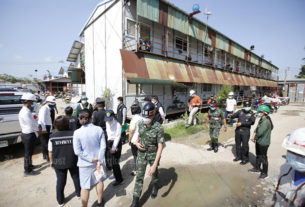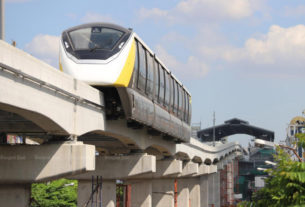A UK researcher at the University of Loughborough will set off to begin measuring air pollution across Thailand this week on his motorcycle.
Christopher Crosby, research associate at Loughborough University’s School of Civil and Building Engineering, will ride 2,000km across Thailand from Thursday (May 28) for two weeks as part of a project to map pollution levels and hotspots in real-time using GPS and Go-Pro video technology.

Christopher Crosby will ride his motorcycle 2,000km across Thailand
According to the University, Dr Crosby will be the first person on a motorcycle to measure pollution levels using mobile air sensors, visiting a number of cities, industrial centres, rural areas, and tourist attractions along the route, including Bangkok, where there are high levels of air pollution.
A number of different air sensors will be attached to both Dr Crosby and the motorcycle to determine concentrations of airborne particulate matter (PM) which pass through an engine’s air filter system or into people’s lungs. As Dr Crosby and the motorcycle pass through air, the laser analysers will detect these particles and record their mass per cubic metre.
The expedition has been organised as part of Dr Crosby’s ‘Every Breath Counts’ project, through which he aims to develop a monitoring and risk assessment toolkit.
He hopes the project will enable public and environmental health officials worldwide to better understand the risk and severity of exposure to PM, using monitoring regimes and risk profiles.
Dr Crosby said: “Current methods of pollution data collection are static, costly and restricted to monitoring specific locations, leaving vast areas untouched. By taking to two wheels armed with a variety of air sensors, I will be collecting data on pollution levels across Thailand at different times of the day. I will then be able to pinpoint certain pollution hotspots and calculate the long-term risk associated with specific modes of transport on certain journey routes.”
He added that work was also underway on a new pollution sensor for pedestrians, cyclists and motorists, called the Particulate Matter Smart Sensor (PMSS), which will alert users to poor air quality and suggest mitigation or avoidance action or such as route diversion.
Smartphones
According to Loughborough University, live data will be transferred from the device to smartphones via bluetooth or an app, and also to cars via GPS, displaying itself in the form of air quality forecast maps and bulletins. The wearable sensor can also be used to monitor inside buildings.
Dr Crosby continued: “A personal air pollution monitor has the potential to indicate when medication or other preventative measures are needed, and allows people to know exactly what the air quality is like that they are breathing every day.
“Air pollution is an invisible killer that affects so many people’s health, which is why I’m trying to raise its profile and make the invisible ‘visible’, and ultimately improve people’s quality of life around the world.”
The Thailand trip is part of an intended Fellowship proposal funded by the University and the Engineering and Physical Sciences Research Council (EPSRC). It has been supported by the Higher Education Funding Council for England’s Higher Education Innovation Fund and will see Dr Crosby work with the Asian Institute of Technology and Chulalongkorn University in Thailand.
Source: http://www.airqualitynews.com/2015/05/26/uk-motorcyclist-to-measure-thailand-air-pollution/


